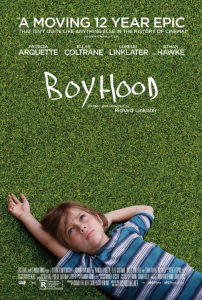film review: boyhood
 Richard Linklater’s newest gem, the flick Boyhood, has really caused quite a stir in the film and media industry. It’s being hailed as one of the best movies of the decade; Rotten Tomatoes has rated it at 99%, and Roger and Ebert writer Matt Zoller Seitz gives it 4 stars. Linklater has been working on the film for 12 years, following around the same actors, and focusing on what it’s like to grow up as a young man in America. As film critic Kyle Buchanan writes for Vulture, Boyhood was shot in ‘three – or four-day increments for the last twelve years,’ thus, to say this movie is highly anticipated would be ‘an understatement, since few films have been teased as long as this one.’
Richard Linklater’s newest gem, the flick Boyhood, has really caused quite a stir in the film and media industry. It’s being hailed as one of the best movies of the decade; Rotten Tomatoes has rated it at 99%, and Roger and Ebert writer Matt Zoller Seitz gives it 4 stars. Linklater has been working on the film for 12 years, following around the same actors, and focusing on what it’s like to grow up as a young man in America. As film critic Kyle Buchanan writes for Vulture, Boyhood was shot in ‘three – or four-day increments for the last twelve years,’ thus, to say this movie is highly anticipated would be ‘an understatement, since few films have been teased as long as this one.’
Boyhood is about young Mason, played by newcomer Ellar Coltrane, who is a boy growing up in a disjointed family. His mother, played by Patricia Arquette, has clearly left their father, played by Ethan Hawke, and had Mason and his older sister Samantha (played by Linklater’s own daughter Lorelei Linklater) when she was very young. We watch all of Mason’s big and small moments – whether it be his haircuts, his time at school being bullied, the first time he tries beer, or his high school graduation. All these moments will seem familiar to audience members at least in some way because we’ve all experienced growing up. We see the family in turmoil. We watch ‘the failed marriages, the financial woes, the abuse of alcohol and drugs, sibling love and feuding’. Hawke’s character bluntly tells Mason, while they are on a brother, sister and father bowling excursion, that they can’t use bumpers because ‘life doesn’t give you bumpers!’ This rings true throughout Boyhood; nothing in life, or in this film, is given any padding – Mason, in growing up, is constantly forced to do things he doesn’t want to do, to experience things he doesn’t know how to handle just yet, and sometimes goes without back-up until it’s too late. It’s just like life.
The film feels, at times, writes Leigh Paatsch of The Herald Sun, like ‘nothing much happens … Aside from life itself.’ But Linklater balances these trivial and important moments with care, and the nothingness that is sometimes on screen ‘turns out to be really something.’
There are the achingly authentic scenes of domestic abuse, first love being lost, and of Mason’s mother struggling to find her way in life. Arquette’s portrayal of a fraught single mother is haunting and beautiful. She explains to Mason near the end of the film, while he’s packing up to leave for college, that she expected there would be ‘much more’ to life than the pivotal moments such as graduating from school, getting married, having kids and getting divorced. She breaks down in tears and gives us no solution to these worries, and we are left feeling just as lost as she is.
The film fails in one important way, however — its title. Boyhood barely grasps the reality of what the film really is. It certainly couldn’t just be called Life, because it focuses too much on young Mason himself as opposed to equally focusing on the family and the society around him as a whole. However, the film certainly could be titled Childhood – a much less gender specific title which actually suits the film quite well. Mason’s sister is a prominent character for most of the story and only disappears, and is then seen sparingly, when she goes to college in the last quarter of the film. My criticism does not stand alone either. The title ‘and choice of protagonist have been criticised … for unthinkingly confirming that heterosexual men are at the centre of the universe.’ Boyhood redeems itself of this failure though, by actually being about much more than this, so it is a shame really that the title lingers in such a negative way.
Boyhood feels not like a movie but like life itself – a truly magnificent achievement indeed. As Matt Zoller Seitz so delicately puts it, the film forces us, as an audience of both life and the film, to accept the fact that ‘if life is “about” anything, it’s about realising and accepting … that everything is fleeting.’ All moments linger in time but then also fly by without warning and we are left asking — what happened to all that time we thought we had? What happened to my childhood?

